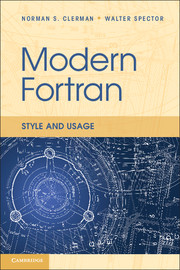Book contents
- Frontmatter
- Contents
- Source Code Listings
- Preface
- 1 Introduction
- 2 General Principles
- 3 Formatting Conventions
- 4 Naming Conventions
- 5 Documentation Conventions
- 6 Programming Principles
- 7 Programming Conventions
- 8 Input and Output
- 9 Packaging Conventions
- 10 Generic Programming
- 11 Object Orientation
- 12 Parallel Processing
- 13 Numerical Types, Kinds, and Operations
- 14 C Interoperability
- 15 Updating Old Programs
- A Source Code
- B Rule List
- Bibliography
- Index
6 - Programming Principles
Published online by Cambridge University Press: 05 December 2011
- Frontmatter
- Contents
- Source Code Listings
- Preface
- 1 Introduction
- 2 General Principles
- 3 Formatting Conventions
- 4 Naming Conventions
- 5 Documentation Conventions
- 6 Programming Principles
- 7 Programming Conventions
- 8 Input and Output
- 9 Packaging Conventions
- 10 Generic Programming
- 11 Object Orientation
- 12 Parallel Processing
- 13 Numerical Types, Kinds, and Operations
- 14 C Interoperability
- 15 Updating Old Programs
- A Source Code
- B Rule List
- Bibliography
- Index
Summary
Standards Conformance
Always write standard-conforming code.
Adherence to no other guideline in this book will make your code more portable than adhering to this one. Over the years, compiler vendors and others have added numerous nonstandard extensions to the language. There is no guarantee that every compiler will support them or that any given compiler will continue to do so in the future.
When you write code that conforms to the standard, you can expect and demand that a “standard-conforming” compiler will successfully compile it. If it cannot, you have a good indication that either your code is in error, that it does not conform to the standard, or that there is a problem with the compiler itself. Most compilers can provide warning messages when encountering nonstandard code. If possible, do not depend on a single compiler as a reference. Compiling code through several different vendors' compilers can often expose additional errors. (See also Rule 4 and Section 15.3.)
Do not rely on compiler switches that change code semantics.
Many compiler vendors have added switches to their compiler directives that provide a capability that the programmer must otherwise provide by writing code. Some compilers, for example, have a switch that will automatically initialize all variables or change the default kinds of variables. Others have switches that remove the necessity for explicitly including the implicit none statement in every program unit. You should not use these; they make your code nonportable.
- Type
- Chapter
- Information
- Modern FortranStyle and Usage, pp. 44 - 97Publisher: Cambridge University PressPrint publication year: 2011



